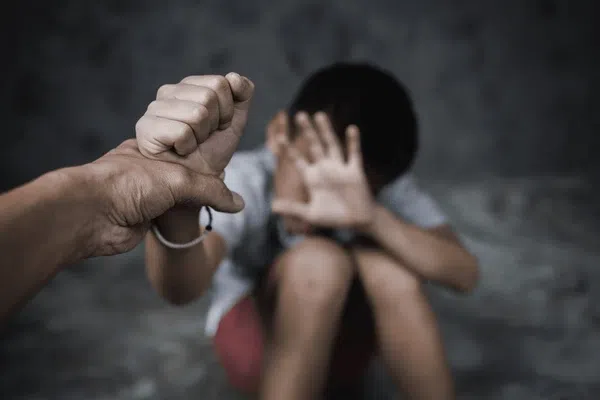“I was only nine when it started. My aunt would call me into her room when no one was around, telling me to ‘play a game’ with her. I froze every time, trapped between fear and confusion, while her hands moved where they never should. Deep down, I knew it wasn’t right, but I couldn’t say no. I hated myself for not fighting back. She would threaten to report me to my mum if I refused to give in to this ‘game’. This went on for years that felt like forever. No one suspected a thing, so I carried the weight alone because boys are supposed to be strong. I was a child, yet made to feel guilty for what I never asked for…”
This, and many others like it, are the realities of countless men and boys living among us. Abuse does not respect gender. It does not care if you are tall, broad-shouldered, or have been taught all your life to be strong.
In Nigeria, and across the world, countless men live quietly with the bruises, the isolation, and the disbelief that follows when they dare to speak up. Their scars are hidden because society refuses to see them.
I once read a comment under a domestic abuse story: “He probably enjoyed it.” That short sentence, just four words, is one of the reasons many men continue to suffer and die in silence.
RECOMMENDED: The horrors of genital mutilation practised in Africa
What the statistics reveal about male abuse
Globally, research suggests that 1 in 10 men have experienced sexual violence by an intimate partner or close relation in their lifetime. The Centres for Disease Control and Prevention (CDC) states that 1 in 9 men will experience physical violence from an intimate partner in their lifetime. Yet only a fraction reports it.
In Nigeria, official numbers are almost nonexistent; not because it isn’t happening, but because the data is rarely collected, and when it is, men are largely excluded from the narrative.
Men who are emotionally, physically, or sexually abused often don’t fit the stereotype of a “victim.” They are told to endure. They are mocked when they cry out. And in a culture that frequently measures masculinity by silence, their suffering becomes invisible.
What about male children who are sexually abused? UNICEF reports that an estimated 410 to 530 million males worldwide, around 1 in 7, experienced sexual violence in childhood. Even more alarming, 240 to 310 million of them, roughly 1 in 11, were raped or sexually assaulted.
RECENT: Real Stories: I was molested by my female cousin, but no one believed me because I’m a man
A survivor’s story: “I tried to tell someone, and they laughed”
One Lagos-based survivor, who asked to remain anonymous, described how his girlfriend repeatedly hit him during arguments and once burned his arm with a hot iron. “When I tried to tell my friend and he laughed. He said, ‘Guy, how woman go dey beat you?’ That was the last time I ever spoke about it.”
This isn’t an isolated story. The laughter, the disbelief, and the shame are part of what keep male abuse victims locked in silence.
Conversations like this one on X highlight how quickly male abuse is dismissed in public spaces.
)
)
The silence around male abuse
Why don’t we hear about it enough? The reasons are layered and painful:
-
Cultural conditioning: From boyhood, men are taught that showing vulnerability is weakness. This mindset pressures men to suppress their pain, endure abuse in silence, and avoid seeking help even when their lives are at risk.
-
Legal and institutional neglect remains a major barrier for male victims. In Nigeria, most domestic violence policies are written with women in mind, leaving men largely invisible. Research shows that the country has no laws that specifically address domestic violence against men.
-
The fear of ridicule and the idea that “a man can’t be abused” is still a dominant mindset.
Even globally, only a few countries have substantial shelters or dedicated services for men facing abuse. In Nigeria, those options are nearly nonexistent.
READ ALSO: Nigerian justice struggles with rising number of sex abuse cases
The psychological cost of silence
![Men should be encouraged to speak up [jointBaseCharleston]](https://image.api.sportal365.com/process/smp-images-production/pulse.ng/02092025/cafa7373-63c7-4b9a-86a5-7b04345ef554.jpeg?operations=fit(1042:))
Men should be encouraged to speak up [jointBaseCharleston]
Abuse does not only leave physical scars. Men who suffer in silence often develop severe anxiety, depression, and even suicidal thoughts. They may begin to overcompensate by becoming hyper-masculine, emotionally withdrawn, or even violent themselves because they have no safe outlet.
What needs to change?
We need to start with listening without ridicule. Thus creating room for truth, even when it doesn’t fit our expectations.
What do we need to change?
-
Our policies must evolve. Domestic violence laws in Nigeria and support systems must explicitly include men as potential victims.
-
Media representation matters; that’s why this article exists. The stories we tell should reflect all realities, not only the ones society chooses to acknowledge.
-
Education must also shift. Boys should be taught early that strength includes asking for help.
Help for abuse victims
Abuse does not make you weak, and you are not alone. If you’ve experienced abuse, know that help is available.
You can reach out to confidential helplines like the Lagos State Domestic and Sexual Violence Response Team at 0800 033 3333 or 0800 800 8001.
Document the abuse, whether through photos, messages, or medical records and confide in someone you trust. Most importantly, never stay silent.
SEE THIS: Child sexual Abuse prevention
Where do we go from here as a society?
As a woman writing this, I’ve witnessed how often men are denied the chance to speak about their pain. Too many times, their suffering is reduced to the punchline of a joke.
This is not to minimise the suffering of women; every abused victim matters, regardless of gender. As a society, if we are serious about ending abuse, then we must also protect our boys and give men the right to be heard. Silence protects no one; it only prolongs the harm.
If you know a man who may be going through this, ask him, without judgment, how he is. If you are a man living this reality, your story matters. Share it. Speak it. Because healing begins where silence ends.
RECENT READS: Real Stories: I had an affair with my pastor’s wife, now she says she’s pregnant








